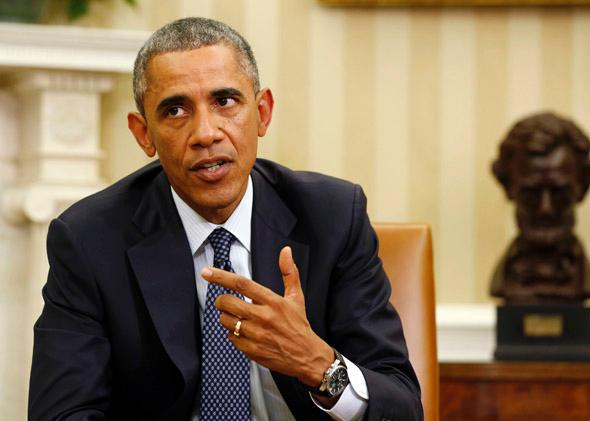Republicans have found a health expert to guide our nation’s policy on Ebola. The expert is you, the American people. According to polls, most of us want the government to ban all travel to the United States from Guinea, Liberia, and Sierra Leone. Therefore, the argument goes, the government should do it.
“We couldn’t agree more with the American people that a travel ban must be put in place,” seven Republican senators wrote in an Oct. 17 letter to President Obama. Congressman Cory Gardner, running for the Senate in Colorado, says “an overwhelming majority of the American people believe that we should put this in place.” Rep. Sam Johnson of Texas is introducing a travel ban in Congress because Obama “is refusing to listen to the American people.” Virginia lawmakers, citing the views of “the American people,” are calling for a ban on travel from West Africa to their state. Behind these initiatives, an army of conservative media outlets is quoting polls and trumpeting what “the American people want” and “the American people favor.”
On some issues, this kind of thinking is healthy. It’s democracy. But on matters of science and medicine, it’s reckless. The reason why public opinion on Ebola diverges sharply from what experts recommend, not just on a travel ban but on everyday behaviors to avoid the virus, is sheer ignorance. Telling health officials to listen to the public, rather than the other way around, is the worst kind of demagoguery.
Most Americans do favor a travel ban. Depending on how you word the question, the percentage in favor ranges from 58 percent in an NBC News poll to 60 percent in a Fox News poll to 67 percent in an ABC News/Washington Post poll. But surveys also show high levels of misinformation. In a poll taken for the Harvard School of Public Health, 88 percent of respondents said it’s likely—and 58 percent said it’s very likely—that a person could catch Ebola from “being sneezed or coughed on by someone who has Ebola.” In a Harris/Health Day poll, 75 percent said they were “concerned that individuals carrying the Ebola virus will infect others before beginning to show symptoms.”
Given these fears, many people are taking extreme measures. In the Harris survey, 26 percent of respondents said they planned “to cancel or cut back on upcoming business travel plans,” and 23 percent said they were “less likely to leave my home if I can avoid it.” In a Reuters/Ipsos poll, 37 percent said they were “avoiding domestic air travel,” 33 percent were “avoiding travel on trains,” 33 percent were “avoiding large crowds or public spaces,” and 26 percent were “avoiding individuals who I know have traveled recently within the U.S.”
None of this makes sense if you know the evidence. According to the Centers for Disease Control, “Unlike respiratory illnesses like measles or chickenpox, which can be transmitted by virus particles that remain suspended in the air after an infected person coughs or sneezes, Ebola is transmitted by direct contact with body fluids of a person who has symptoms of Ebola disease.” The CDC found that in studies, “Airborne transmission of EVD among humans has never been demonstrated.” Furthermore, “A person must have symptoms to spread Ebola to others.”
Health officials have lots of experience with epidemics, including previous Ebola outbreaks. They know what works and what doesn’t. Banning travel from the entire region does more harm than good. “When countries are isolated, it is harder to get medical supplies and personnel deployed to stop the spread of Ebola,” says the CDC’s director, Dr. Tom Frieden. Moreover, “people in affected countries still find a way to move, and it is even harder to track them systematically.” That’s what happened with SARS and Swine Flu.
Last week at a House hearing, Frieden tried to explain these drawbacks to angry Republican lawmakers. They were unmoved. They had the polls on their side. Rep. Tim Murphy of Pennsylvania, the committee’s chairman, responded to Frieden’s testimony by invoking public opinion:
Murphy: This is the question the American public is asking: Why are we still allowing folks to come over here? And why, once they are over here, is there no quarantine?
Frieden: Our fundamental mission is to protect Americans. Right now we are able to track everyone who comes in—
Murphy: But you’re not stopping them from being around other people, Doctor. I understand that. And I have respect for you. But my concern is, the American people says that even so, they are not limited from travel, they’re not quarantined for 21 days …
After the hearing, Murphy and his colleagues walked straight to a nearby microphone and delivered the message they had planned to deliver all along. The United States should impose a “no-fly zone from that region of the world,” said the senior Republican, Rep. Fred Upton of Michigan. “We need to send the signal now: Our border is closed.”
I’m sure this posturing will help Republicans in the midterm elections. But if the administration were to heed their advice and change its policies to comply with polls, a travel ban would be the least of it. In the NBC News survey, most Americans also said they oppose Obama’s decision “to send U.S. troops to Africa to help fight the spread of Ebola.” They don’t just want West Africans out of the United States. They want Americans out of West Africa.
Pull out the troops, and the epidemic in Africa will spread further and faster. That’s the surest way to help Ebola kill Americans: by giving the American public exactly what it wants.
